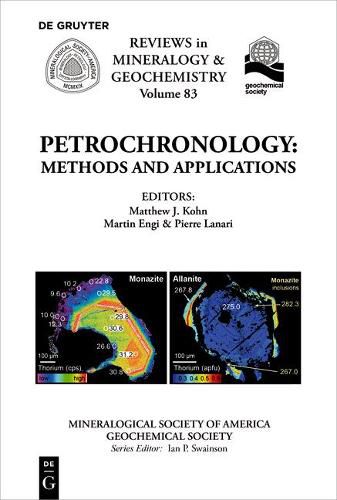Readings Newsletter
Become a Readings Member to make your shopping experience even easier.
Sign in or sign up for free!
You’re not far away from qualifying for FREE standard shipping within Australia
You’ve qualified for FREE standard shipping within Australia
The cart is loading…






This title is printed to order. This book may have been self-published. If so, we cannot guarantee the quality of the content. In the main most books will have gone through the editing process however some may not. We therefore suggest that you be aware of this before ordering this book. If in doubt check either the author or publisher’s details as we are unable to accept any returns unless they are faulty. Please contact us if you have any questions.
Petrochronology is a rapidly emerging branch of Earth science that links time (ages or rates) with specific rock-forming processes and their physical conditions. It is founded in petrology and geochemistry, which define a petrogenetic context or delimit a specific process, to which chronometric data are then linked. This combination informs Earth’s petrogenetic processes better than petrology or geochronology alone. This volume and the accompanying short courses address three broad categories of inquiry. Conceptual approaches chapters include petrologic modeling of multi-component chemical and mineralogic systems, and development of methods that include diffusive alteration of mineral chemistry. Methods chapters address four main analytical techniques, specifically EPMA, LA-ICP-MS, SIMS and TIMS. Mineral-specific chapters explore applications to a wide range of minerals, including zircon (metamorphic, igneous, and detrital/Hadean), baddeleyite, REE minerals (monazite, allanite, xenotime and apatite), titanite, rutile, garnet, and major igneous minerals (olivine, plagioclase and pyroxenes). These applications mainly focus on metamorphic, igneous, or tectonic processes, but additionally elucidate fundamental transdisciplinary progress in addressing mechanisms of crystal growth, the chemical consequences of mineral growth kinetics, and how chemical transport and deformation affect chemically complex mineral composites. Most chapters further recommend areas of future research.
$9.00 standard shipping within Australia
FREE standard shipping within Australia for orders over $100.00
Express & International shipping calculated at checkout
This title is printed to order. This book may have been self-published. If so, we cannot guarantee the quality of the content. In the main most books will have gone through the editing process however some may not. We therefore suggest that you be aware of this before ordering this book. If in doubt check either the author or publisher’s details as we are unable to accept any returns unless they are faulty. Please contact us if you have any questions.
Petrochronology is a rapidly emerging branch of Earth science that links time (ages or rates) with specific rock-forming processes and their physical conditions. It is founded in petrology and geochemistry, which define a petrogenetic context or delimit a specific process, to which chronometric data are then linked. This combination informs Earth’s petrogenetic processes better than petrology or geochronology alone. This volume and the accompanying short courses address three broad categories of inquiry. Conceptual approaches chapters include petrologic modeling of multi-component chemical and mineralogic systems, and development of methods that include diffusive alteration of mineral chemistry. Methods chapters address four main analytical techniques, specifically EPMA, LA-ICP-MS, SIMS and TIMS. Mineral-specific chapters explore applications to a wide range of minerals, including zircon (metamorphic, igneous, and detrital/Hadean), baddeleyite, REE minerals (monazite, allanite, xenotime and apatite), titanite, rutile, garnet, and major igneous minerals (olivine, plagioclase and pyroxenes). These applications mainly focus on metamorphic, igneous, or tectonic processes, but additionally elucidate fundamental transdisciplinary progress in addressing mechanisms of crystal growth, the chemical consequences of mineral growth kinetics, and how chemical transport and deformation affect chemically complex mineral composites. Most chapters further recommend areas of future research.